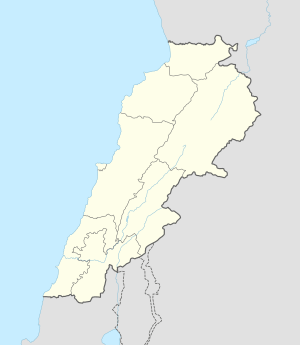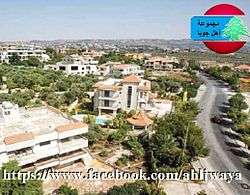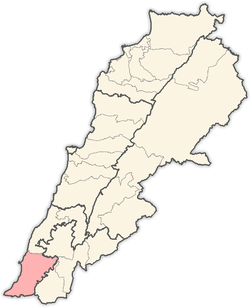Jwaya
| Jwaya جويا | |
|---|---|
| Town | |
|
Jwaya | |
 Jwaya | |
| Coordinates: LB 33°14′N 35°20′E / 33.233°N 35.333°ECoordinates: LB 33°14′N 35°20′E / 33.233°N 35.333°E | |
| Grid position | 181/293 PAL |
| Country | Lebanon |
| Governorate | South Governorate |
| District | Tyre |
| Time zone | +2 |
| • Summer (DST) | +3 (UTC) |
Jwaya (Arabic: جويا) or Jouaiya,[1] is a village in Tyre district, Lebanon. Located in the center of Jabal Amel geographically, 95 kilometers from Beirut, and the county seat of Sidon 54 kilometers and 16 kilometers from the city of Tyre towards the east, rising from the sea at 300 m, a land area of 32.000 dunums cultivated arable including grains, vegetables, olives, figs, and recently citrus and fruit Mahtlfah.
Location
Municipality of Jwaya is located in the Kaza of Tyre (sour) one of Mohafazah of South Lebanon kazas (districts). Mohafazah of South Lebanon is one of the eight mohafazats (governorates) of Lebanon. It's 97 kilometers (60.2758 mi) away from Beyrouth (Beirut) the capital of Lebanon. It's elevations is of 300 meters (1) (984.3 ft - 328.08 yd) above sea level. Jwaya surface stretches for 978hectares (9.78 km² - 3.77508 mi²)(2).
History
In 1596, it was named as a village, Juba, in the Ottoman nahiya (subdistrict) of Tibnin under the liwa' (district) of Safad, with a population of 87 households and 38 bachelors, all Muslim. The villagers paid a fixed tax rate of 25 % on agricultural products, such as wheat, barley, fruit trees, goats and beehives, in addition to occasional revenues; a total of 11,859 akçe.[2][3]
Several lintels have been found here.[4] In 1881, the Palestine Exploration Fund's Survey of Western Palestine (SWP) described it: "A large village, built of stone and of good materials, containing about 1,000 Metawileh. They weave and dye cloth, and have a small market. It is situated on a hill, and is surrounded with olives, figs, and arable land. The water supply is from two springs and many cisterns."[5]
Educational Establishments
The table below provides a comparison of public and private schools locally and nationally. It can be used to assess the distribution of students between public and private institutions both locally and nationally. All data provided on education concerning the 2005-2006 school year.
| Educational establishments | Jwaya (2005-2006) | Lebanon (2005-2006) |
|---|---|---|
| Number of Schools | 6 | 2788 |
| Public School | 4 | 1763 |
| Private School | 2 | 1025 |
| Students schooled in the public schools | 1160 | 439905 |
| Students schooled in the private schools | 530 | 471409 |
Media
- Ahl Jwaya Group: www.ahljwaya.com
- Jwaya First: www.jwayafirst.com
References
Bibliography
- Conder, Claude Reignier; Kitchener, H. H. (1881). The Survey of Western Palestine: Memoirs of the Topography, Orography, Hydrography, and Archaeology. 1. London: Committee of the Palestine Exploration Fund.
- Hütteroth, Wolf-Dieter; Abdulfattah, Kamal (1977). Historical Geography of Palestine, Transjordan and Southern Syria in the Late 16th Century. Erlanger Geographische Arbeiten, Sonderband 5. Erlangen, Germany: Vorstand der Fränkischen Geographischen Gesellschaft. ISBN 3-920405-41-2.
- Palmer, E. H. (1881). The Survey of Western Palestine: Arabic and English Name Lists Collected During the Survey by Lieutenants Conder and Kitchener, R. E. Transliterated and Explained by E.H. Palmer. Committee of the Palestine Exploration Fund.
- Rhode, Harold (1979). Administration and Population of the Sancak of Safed in the Sixteenth Century. Columbia University.
External links
- Survey of Western Palestine, Map 2: IAA, Wikimedia commons
- Jouaiya, Localliban: Centre de resource sur le developpement local
- Ahl Jwaya website: www.ahljwaya.com
- Council Site: www.jwaya.gov.lb
- Jwaya English website: www.jwaya.com
- Jwayafirst website: www.jwayafirst.com
- AhlJwaya on Facebook : www.facebook.com/ahljwaya

